Coin Values Moving with Precious Metals: Up-Dated 4/14/2025: Gold $3226 | Silver $31.88
1934 Penny Value
Popularity and interest of collectors drives 1934 penny value. A main focus of collectors is assembling a collection of cents in high grade. Premium condition coins are needed and premium values are attached to these coins.
First Step: Begin the: Date | Mint Mark | Condition inspection to judge how much a 1934 cent is worth.
Different mints producing coins (identified by mint marks) are important varieties, and listed on the charts.
Continue with judging condition. Compare to images of the different grades finding a close match to condition.
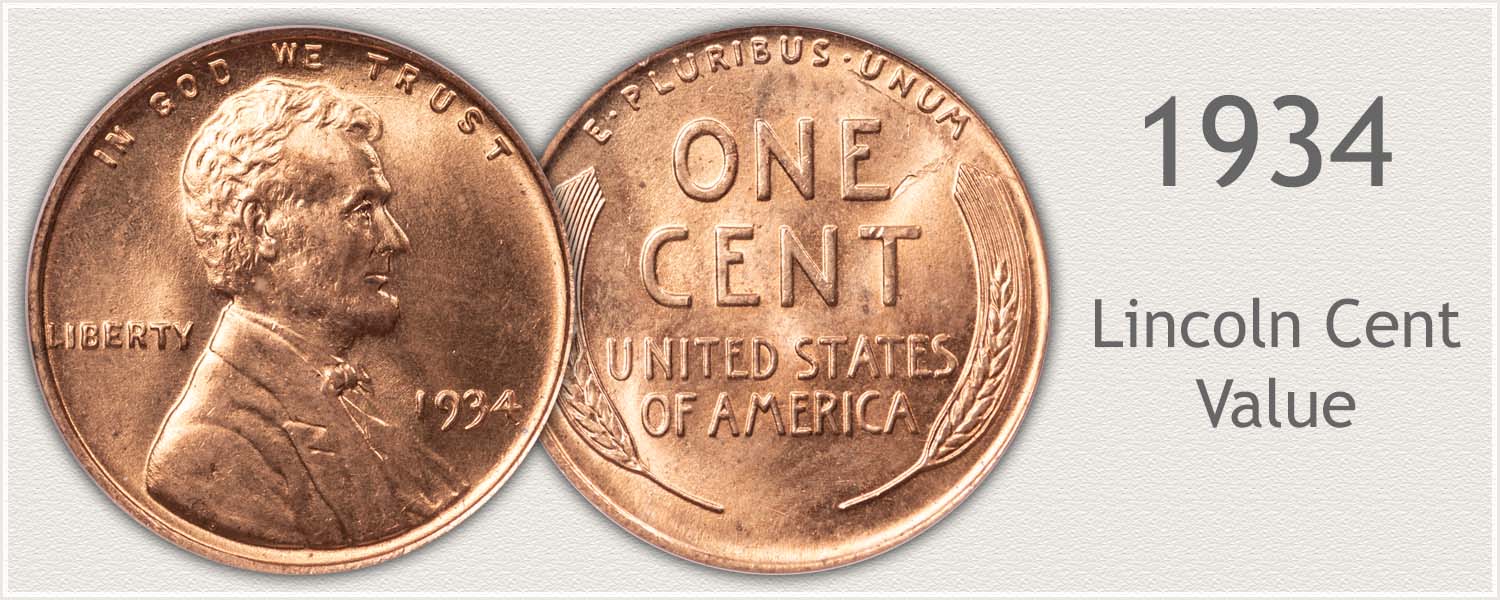
Steps Leading to Value:
- Step 1: Date and Mintmark Variety – Identify each date and its mintmark variety.
- Step 2: Grading Condition – Judge condition to determine grade.
- Step 3: Special Qualities – Certain elements either enhance or detract from value.
| 1934 Lincoln Penny Value | ||||
|---|---|---|---|---|
| Condition of Coin | ||||
| Date | Good | Fine | Extremely Fine | Uncirculated |
| 1934 Lincoln Penny Value Up-Dated | 2025 | |||
| 1934 | $0.06 | $0.14 | $0.38 | $5 |
| 1934 D | $0.08 | $0.23 | $0.50 | $9 |
Here the process of accurately judging a coin begins. Three key factors are needed. Date | Mint Mark | Condition
Date and Mint Mark determine the variety of 1934 cent. Each is listed separately and scarcity affects their value. Identify the mint mark from the images.
Condition of a coin is graded against a standard. Images of grades are used to compare your coin finding a close match narrows the value range.
Step 1: | Date and Mintmark Combination
Two Varieties of 1934 Cents to Identify
The US Mint reported an increased demand for coinage in 1934. Responding with a total output of 247,526,000 cents struck. High production continued throughout the rest of the wheat design ending in 1958. 1934 marks the beginning of the second era of wheat cents 1934-1958.
1934 Lincoln Penny
No Mintmark Under Date: Philadelphia Mint Struck the Coin
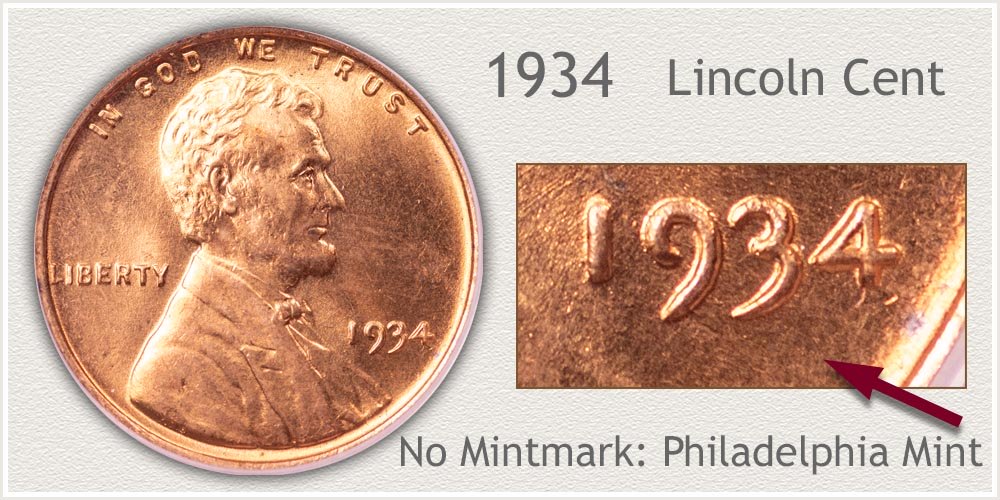
Value of 1934 Philadelphia cents reflects its Abundant supply on the rarity scale. A lightly worn coin in the Extremely Fine grade carries a premium, requiring a closer inspection.
An interesting feature to collectors is the unique style of the "3" in the date. A block "3" was replaced with a more stylized "3" in 1934 only. With a more elegant look to the date and a unique design its popularity is assured.
1934-D Lincoln Penny
"D" Mintmark Under Date: Denver Mint Struck the Coin
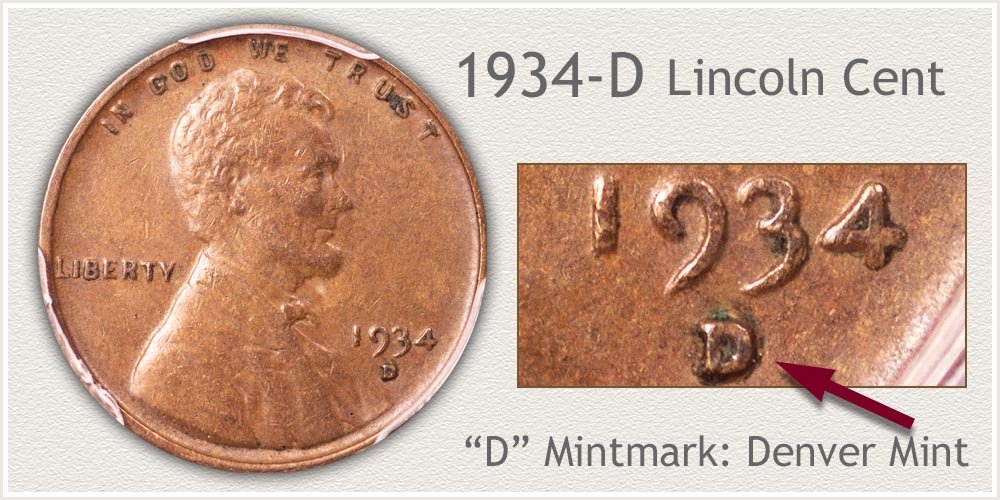
Denver 1934 cents represent the second variety. Striking far fewer (28,446,000) than Philadelphia. Here is an example were original numbers does not affect value. Abundant on the rarity scale. Many are available to collectors, and with many to choose from their interest is in higher condition examples.
A premium is awarded to coins that have not been cleaned, free from distracting marks and crisp details. Lincoln's coat is an area prone to loosing boldness. A strong line separating the bow tie from the coat is indicating a higher grade.
Step 2: | Judge Condition to Identify Grade
1934 Penny Value Tied to Condition
Condition is the level of preservation coins display. Grade denotes this and is used by collectors when describing and placing a value on a coin. Images below help visualize these different stages of condition.
When viewing your coin in the grading process, use a single light source. Holding the coin a small distance from a 100 watt light and tilting at a shallow angle brings out subtle details.
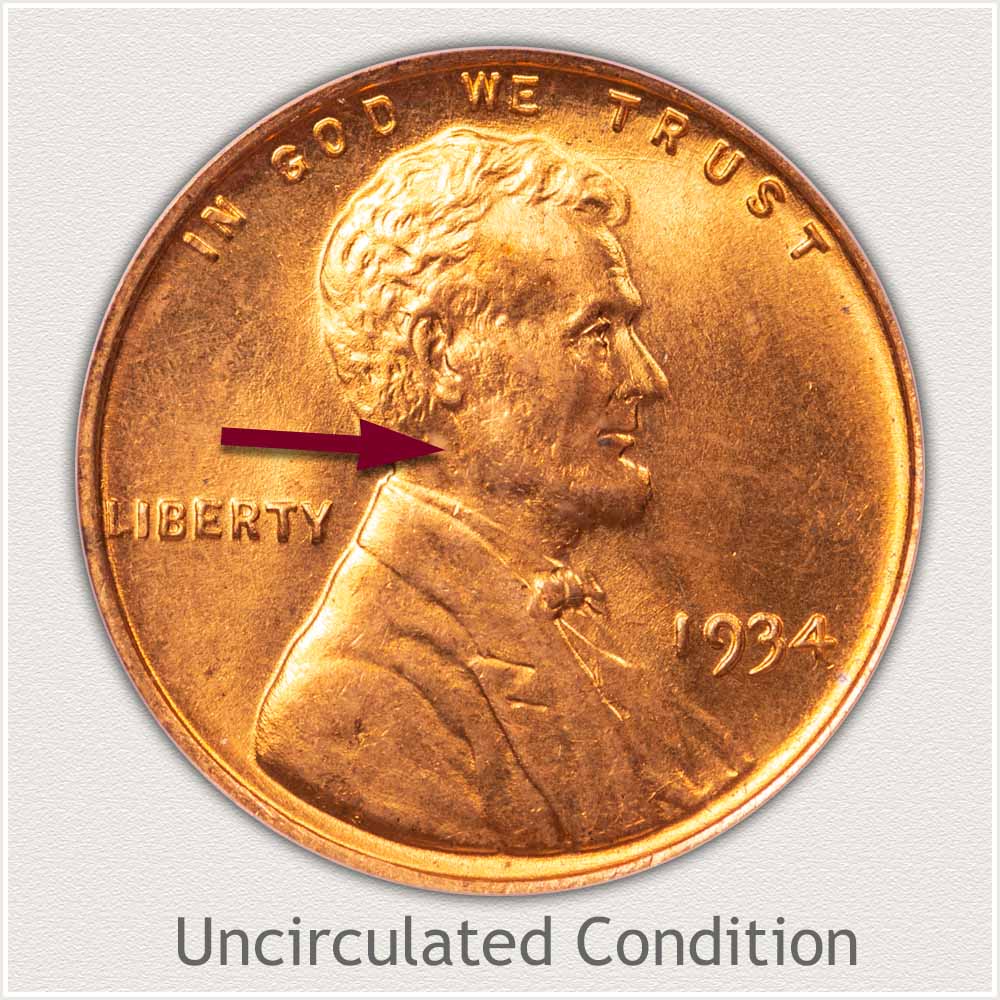
Uncirculated Grade: An uncirculated coin has no wear to its surface. Copper coins tone a variety of shades of brown over time but is not an indication of circulation wear. Lincoln's jaw extending to his ear is an area prone to first wear, judge for any smoothness and lack of luster.
With all original design detail still intact view Lincoln's chin and jaw. It is covered with a beard clearly showing details. Many subtle high and lower areas are visible extending to the lower ear. A texture of luster must cover the entire area and sit on top of the fine details. No smoothing to the metal is evident.
Wear would show at Lincoln's jaw very quickly if a coin entered circulation. Bright luster is a plus for the 1934 mint state coin imaged. Few marks disturb the surface and no dulling of shine caused by wear.
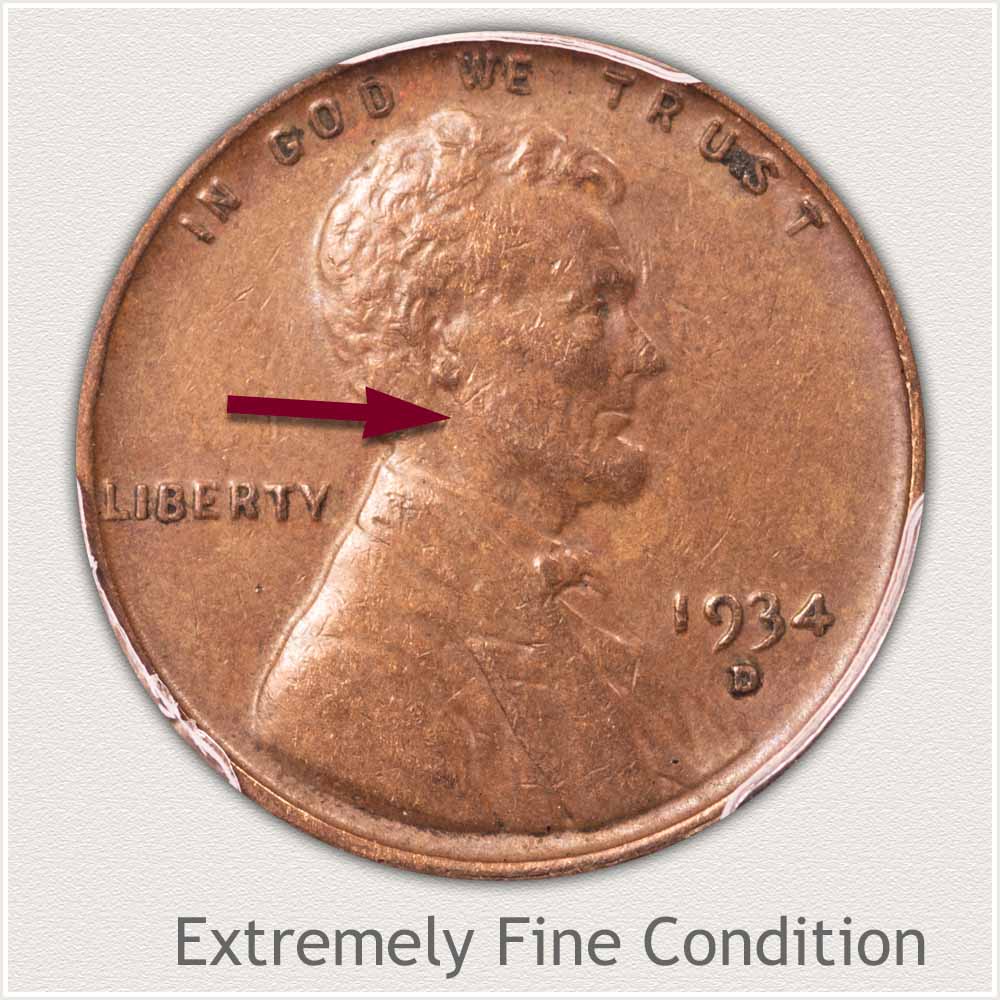
Extremely Fine Grade: Areas of light wear are visible on an Extremely Fine grade wheat cent. Overall appearance of Lincoln's jaw is bold with many protected areas full of finer details.
Down the center of the portrait is high in profile extending to Lincoln's chin. Wear on his jaw extending to the chin remains light with minor flattening of the metal. A clear separation is noted between the ear and jaw. Only a small line of flatness indicates light wear.
Bold devices, sharp legends, and a well raised date enhance eye appeal of this 1934-D penny. A nice quality example sought by collectors. Wheat pennies from the 1930's are sought in high circulated grades. A pleasing circulated example fits nicely into collections.
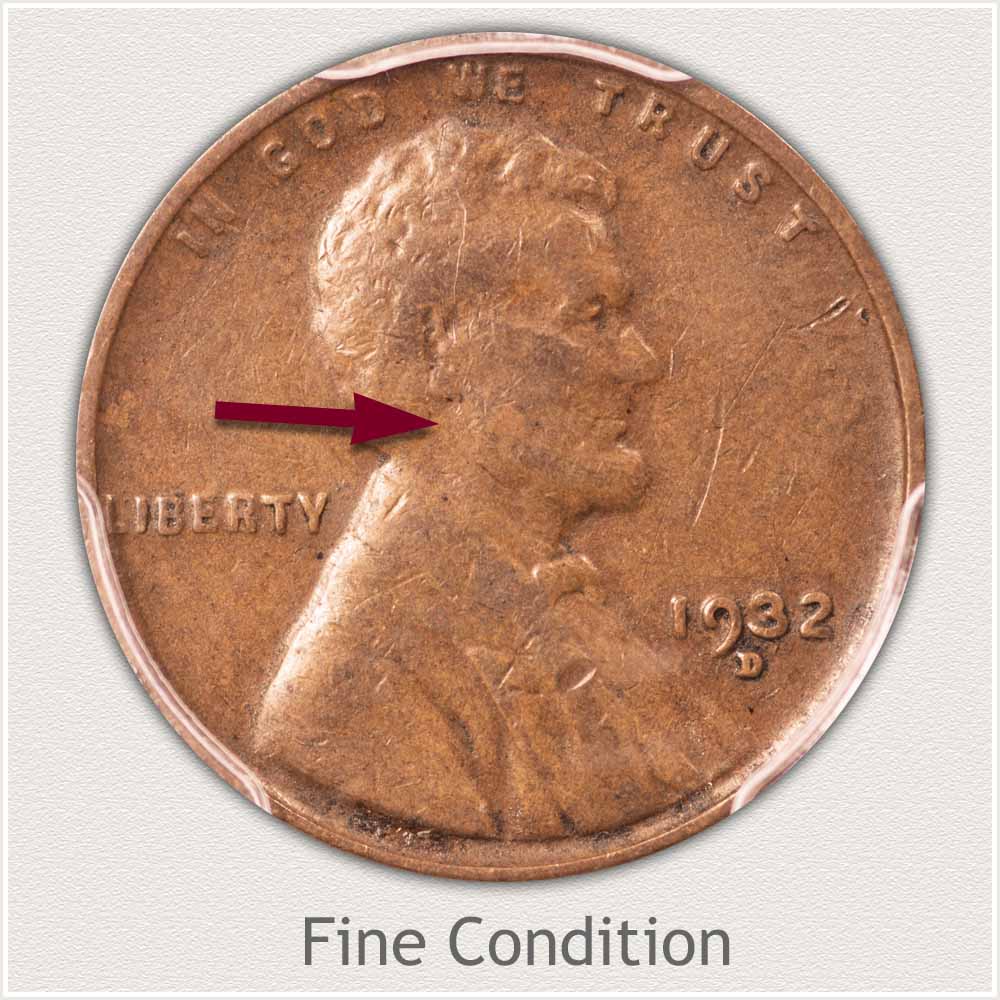
Fine Grade: Moderate wear with major design elements remaining defines a wheat penny in Fine grade. Smoothing of finer detail along Lincoln's jaw line is noted. However, no wide-spread flatting is evident.
Lincoln's jaw is lacking evidence of a beard. Smooth surface areas just begin to connect with the lower ear. Separation from his cheek remains with a lower relief area between.
Important to value is a pleasing appearance of color and mark free surfaces to these old wheat cents. Light brown color with deeper shades within the recesses and fields presents a nice-looking collectible coin.
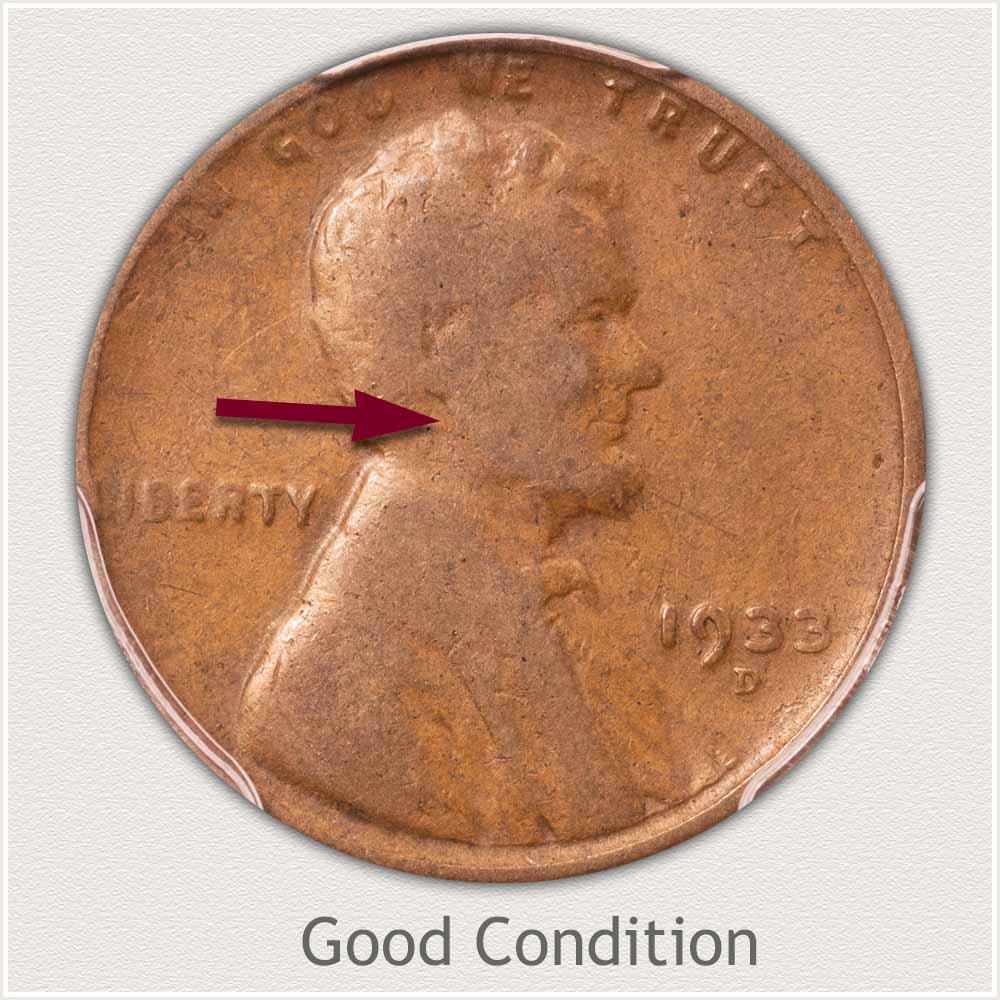
Good Grade: Heavy wear leveling most of the design is a wheat cent in the Good grade. A strong outline of Lincoln remains. His jaw is distinct from the neck. Date and legend are well defined.
Lincoln's jaw has now merged with the lower ear and is a flat area extending to chin. A once deep contour separating cheek and jaw is worn to a smooth plane.
Visual qualities help strengthen value of lower grade wheat cents. Even coloring of toning is appealing to collectors. A lack of distracting marks, and strong legends and date are well received. A wheat cent combining all of these traits; nice color and bold details is solid for the grade.
Video | Grading Lincoln Wheat Pennies
Grading Lincoln Wheat Pennies continues the process of judging condition. Video, images, and descriptions are used to define important point to the obverse and reverse.
Step 3: | Special Qualities Enhancing Value
Attention to Detail Finds Collector Quality and Value
1934 is a pivotal year in wheat penny values. Circulated coins below the grade of Extremely Fine are now found in large quantities. Average circulated condition coins are worth a few cents each. In contrast any date prior to 1934 is well above this minimum value in similar condition.
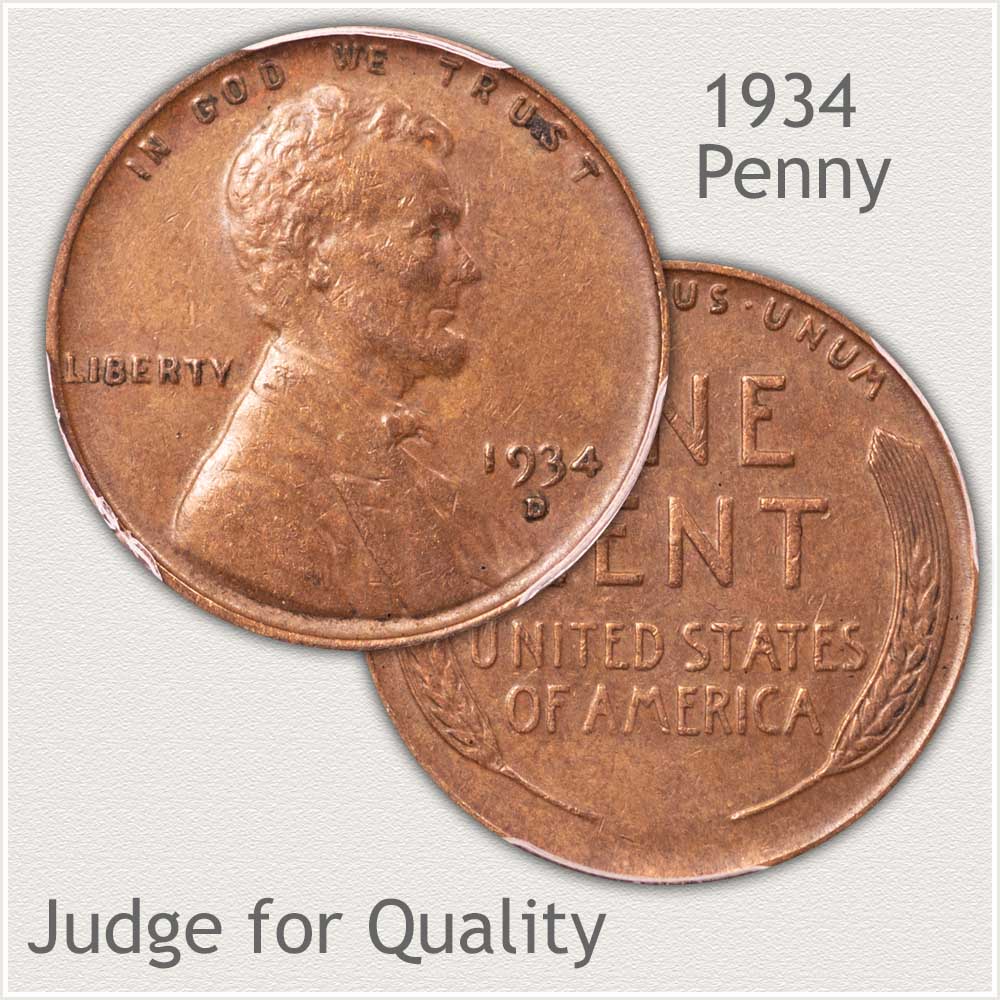
To recognize a higher quality circulated coin, look for several features.
- Even toning without any splotches of dark areas. An absence of concentrated debris within lettering.
- Large marks noticeable to the eye, lower quality. Fields of the coin free of major marks is desirable.
- Crispness to overall look of the coin. Well defined bow tie and date are focal points, when sharp these are a strong plus.
Attention to eye appeal plus grading for wear identifies a better-quality coin. These above average condition coins dated in the mid 1930's draw attention from young and new collectors.
ReferencesUS Mint. 1935 US Mint Annual Report https://nnp.wustl.edu/library/publisherdetail/51
Coin Values | CoinStudy Articles
Lincoln Wheat cents span the years 1909 through 1958. From the top condition coins collected by advanced collectors to worn examples; to an affordable collection for young collectors, the range of value is extensive. Identify your date, mint and condition and refer to the value chart.
Printable sheet to list and inventory your coins.
★ Coin Values Discovery finds 1934 Penny Value and...
All US coin values. Recognize your old coins using the image links leading to value charts. Date | Mintmark | Condition are considered; all described and imaged within each series. Surprising value is often found in the smallest of detail.